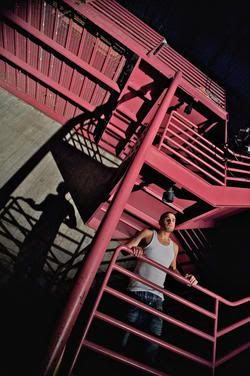
This month Pangea World Theater and Teatro del Pueblo collaborated to present Oedipus el Rey at the Guthrie Lab Theater.
Oedipus el Rey originally premiered at San Francisco's Magic Theater in February 2010, interpreting the classic myth of Oedipus in the modern California penal system and an LA barrio thanks to the work of Luis Alfaro. Instead of the road to Thebes, Oedipus journeys along Highway 99 from San Francisco to Los Angeles with a chorus of prison inmates.
Director Dipankar Mukherjee asked some provocative questions in his director's notes. "What does this act of a Chicano writer appropriating a Greek myth mean to contemporary society?" and "As artists, do we have an accountability to intervene on the question of violence? Are the youth in this economically strapped world fated to spiral down or do we have the audacious possibility to question fate?"
Next month, starting April 14th to May 1st, Pangea will be presenting its Alternate Visions Festival.
The first Pangea production I ever caught was an interpretation of Ovid's classic, Metamorphosis, also at the Guthrie Labs. They've always asked interesting questions with the material, but I particularly appreciated them working with Teatro del Pueblo here because I have a personal fondness for the classic myth of Oedipus, which features prominently in several of my poems such as Thread Between Stone.
I could gush about the set-design, costumes and choreography. But I'll leave that for others to remark upon.
I think it's more important to reflect on the question of cross-cultural perspectives informing this production. To have so many cultural aesthetics involved, clashing across time and tradition on-stage was intriguing and often well-executed. Those aesthetics were not merely cosmetic, but deeply internal, invoking both modern and traditional forms that stretched the actors skills. There were elements of African American theater, South Asian and Latino aesthetic thought and nods to Asian and Asian American stylization.
For me, I was also curious where the performance would take real risks, because that's when art becomes transcendent.
The story of Oedipus is often neutered in the modern classrooms it's taught in. But it is among the most prominent and accessible even after centuries, in terms of transgressive concepts: The themes of a man fighting against his destiny, presumably solving the great riddles and still committing some of the most horrible taboos of all to the amusement of the gods including patricide and incest.
In itself, a 'pure' theatrical staging of Oedipus should probably be pushing buttons with its audiences in any time and any culture, no matter what their beliefs. But we've seen such sterile considerations of the story over the years that one of the most powerful stories of humanity has lost a lot of tooth and has been losing ground to more energized adaptations of Medea.
Pangea and Teatro del Pueblo's production of Oedipus el Rey in Minneapolis allowed us to see even more windows into the story than usual, staged in a zone where the voice of Latin American artists and other artists of color can often feel marginalized despite their strong social and economic presence in other parts of the city and the social structure of Minnesota society.
This was an opportunity to study what is offensive to a culture, and yet, what is also true. The updated dialogue is raw, the language at times profane but no worse than one would find on television or film. For devout Christians, some of the imagery is distinctly blasphemous and unsettling, and many in the audience were no longer removed from the powerful and transgressive themes of Oedipus as we might have imagined Greek audiences experiencing so many centuries ago. But the art here is purposeful and not merely shocking or inuring as it crosses lines to connect so many aesthetic and cultural divides.
Sometimes we see global classics shorn of their metaphysical roots. The Hollywood take on the Trojan War with Brad Pitt did away with the Grecian pantheon entirely. Other times, there are modern updates that propel the story into alternate history such as Loncraine's Richard the Third with Ian McKellan or the abstract modernity of Romeo and Juliet with Leonardo di Caprio.
Oddly, modern updates rarely really address real issues of a society's time. How often do we see an effective, modernized adaptation working with communities of color on our own terms, with an unflinching eye wrestling with urgent social issues such as the modern penal system and youth violence.
My lingering question, however, is that although Shakespeare was not the first to tell the story of Romeo and Juliet, his has become the most definitive take on it. Here, Oedipus el Rey covers substantive territory using the original work as a touchstone, but can productions of this particular text redefine our future sense of the story? Just as the Ramyana has had numerous interpretations since in different cultures, has Oedipus el Rey opened a wider pathway for others to approach this story? How interesting a question this would be if it did.
Leaving the play, it's hard for me not to think of how Phra Oedipus, Phra Laos would be staged with transcultural adoptees, Lao American refugees and deportees in Minnesota. How might the Khmer or Karen or Somalians look at this subject, and where would they set it? What would be some of their underpinning concerns?
At the same time, as we watch Neil Gaiman preparing to approach Journey to the West or Grant Morrison approaching the Mahabharata with his animated series 18 Days, how do we respond?


Looking at what happens to films like Infernal Affairs or Akira being re-interpreted without a commitment to their cultural roots, we ask to whom do the world's stories belong. But I think the healthy question is also, where does the art become meaningful and interesting for all of these approaches? It would be a poor thing to see so many retellings take place with nothing interesting to say in the process.
As Shakespeare asks in Julius Caesar:
"How many ages hence, shall this our lofty scene be acted over, in states unborn and accents yet unknown!"
Hats off to Pangea and Teatro del Pueblo for this fine question, and I look forward to their upcoming productions.
No comments:
Post a Comment